Robin Williams’ 10 Best Performances
Robin Williams was a supremely layered performer whose manic intensity was a transparent veneer over a profound, often deeply sad, feeling. He was a generation’s actor, a generation who grew and matured in tandem with his career, who found inspiration, and learned ways to both challenge and get along in the world. Here, then, ten of his best performances (though none of the veneer)…
What was your favourite Robin Williams film? Tell us below!

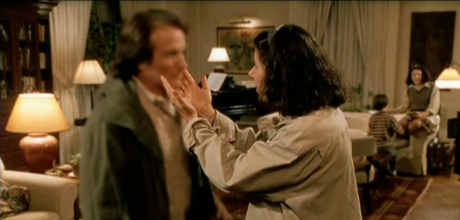
Deconstructing Harry
(Woody Allen, 1997)—A tiny role, but exquisite. A role, also, in which Williams was never seen in focus for a single frame. That’s got to earn a place any list! Williams plays Mel, an actor, who has suddenly gone ‘soft’ in life as well as on camera. As he did in Zelig (1983), Allen uses what is essentially a sight gag to slyly explore depression, of never feeling good enough, in a way that is so much more poignant due to its indirection.

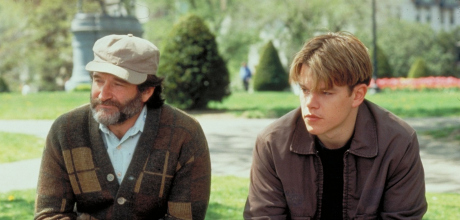
Good Will Hunting
(Gus Van Sant, 1997)—Another of Williams’s anti-authoritarian authority roles, this time playing therapist to Matt Damon’s blue-collar genius. Gentle and challenging, inspiring and nurturing, this is the cumulative role of his career, and won him the Oscar he deserved for many of his other roles as well.

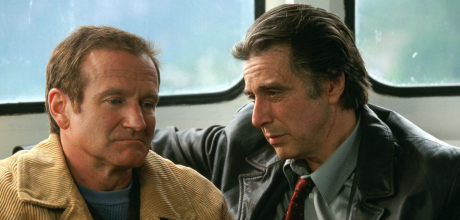
Insomnia
(Christopher Nolan, 2002)—This was the year for Williams’ deranged roles. Here he plays Walter Finch, a mild-mannered crime writer who beat a young girl to death and blackmails a police detective. Williams placid understated menace goes head to head with a fully ripe Al Pacino, ‘Life is so important,’ Finch says sadly, ‘how can it be so fucking fragile?’

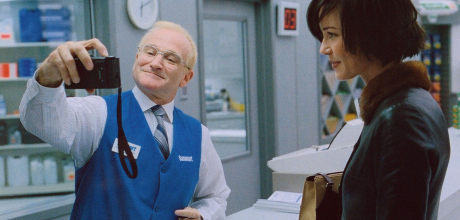
One Hour Photo
(Mark Romanek, 2002)—Leaving the cash flow and innocuousness of Hollywood behind, Williams went independent, playing an insular creep who preys on a family, a manifestation of the pre-digital primordial fear that people in photo labs ogle our most private, intimate moments. And make copies. A performance as implosive as his comedy was explosive.

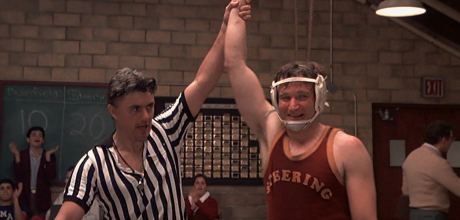
The World According to Garp
(George Roy Hill, 1982)—The film of John Irving’s zeitgeist novel, with Glenn Close, in her first film, as Williams’ mother, a pragmatic feminist (though she was only four years older), and John Lithgow as Roberta Muldoon, a transsexual ex-football player, is a meaty and solid piece of filmmaking, like the kind they used to do, and made Williams an actor and not just a performer. It was the essential vehicle that allowed him to reach escape velocity from Ork.

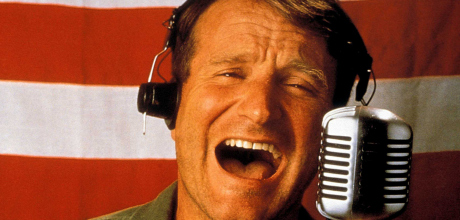
Good Morning Vietnam
(Barry Levinson, 1987)—This was his breakout role, the one that made him a star. It was the one that made him likeable, which is good, and that made him less dangerous, which, sadly, resulted in some too-safe choices later. As real-life Armed Forces Radio Service DJ Adrian Cronauer, this was the perfect film for Williams’s idiosyncratic talents, in a film that was confident and bright and a perfect for the time and place.

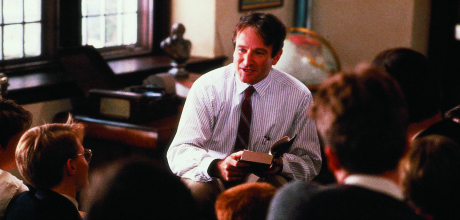
Dead Poet's Society
(Peter Weir, 1989)—An exquisite film about the joy of learning to see the world and embrace it. Williams showed something in this film that is too rare in film, and unexpected in a performer whose hallmark mode is an atomic shotgun of manic energy—the ability to really listen. Williams’s face as Todd Anderson (Ethan Hawke) breaks through captures more clearly than any other film the vulnerability and hyper-awareness of the painful rawness of life, beautiful and tragic all at once, that haunted Robin Williams himself. And all in a single reaction shot.

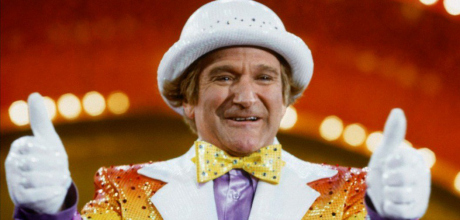
Death to Smoochy
(Danny Devito 2002)—This film manages to capture the intense and hysterical energy of a Williams’s live performance. He’s not trying to be liked here. It’s deliciously vicious, about an insane homicidal children’s entertainer, and also stars Edward Norton and Catherine Keener. And Jon Stewart and Harvey Fierstein! How could it not be a winner?

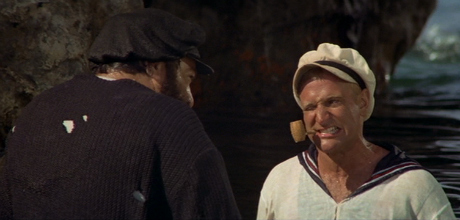
Popeye
(Robert Altman, 1980)— Harry Nilsson songs? Jules Feiffer script? Shelly Duvall as Olive Oyl? Robert Altman, at the peak (or trough) of his not giving a shit? This was Williams first starring role, mid-Mork, a live-action cartoon with Tourettes and who ‘gots a lot of muscle but I only gots one eye,’ in a brazen, gorgeous film that’s like being trapped in LSD-induced psychosis.

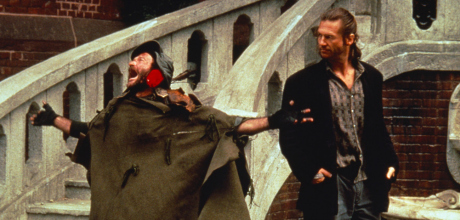
The Fisher King
(Terry Gilliam, 1991)—Easily the best performance of his career. Easily the best performance of Jeff Bridges’s career. Easily the best film of Terry Gilliam’s career. Williams plays Parry, a man driven to delusion and homelessness through grief, whose quest for the Holy Grail in New York City is merely heartbreaking filmmaking legerdemain for what’s really going on.



COMMENTS